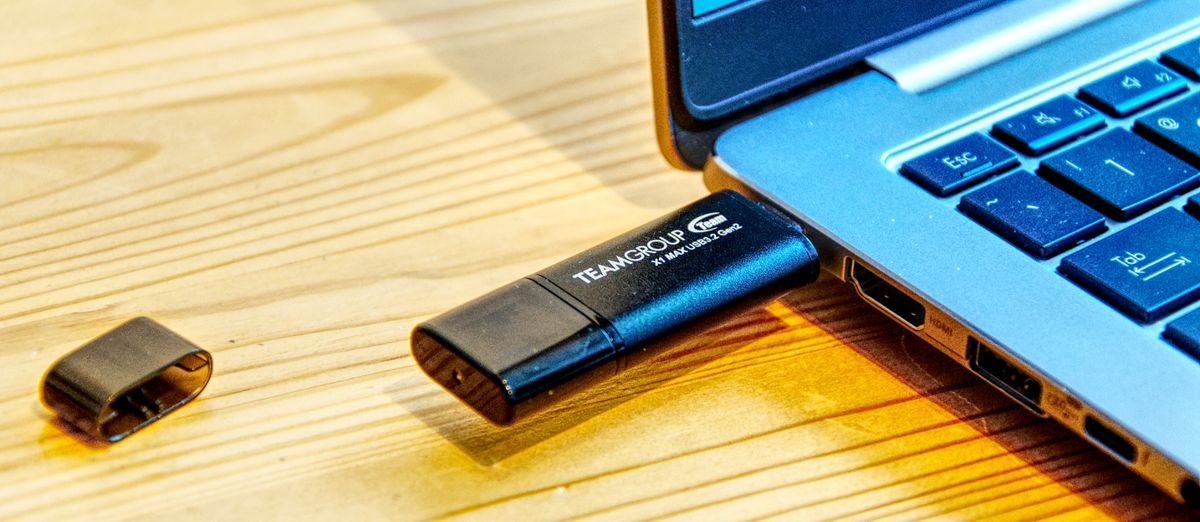30-second review
When drives like the X1 Max first appeared, they were nicknamed ‘Thumb’ drives, and they were typically designed to work with USB 2.0 Type-A ports.
Appearances can be misleading, and the X1 Max isn’t a cheap USB flash drive with 30-40MB/s performance but an extremely portable SSD supporting USB 3.2 Gen 2 technology. Inherently, it also supports Type-A and Type-C ports, meaning that there is no need to carry a cable.
The X1 Max offers capacities up to 1TB, starting at 128GB, in a gum-stick-sized package that can deliver 1000MB/s transfer speed with a suitable Gen 2 USB port.
It works with any version of Windows from XP onwards, Mac OS 10.6 or later, Linux 2.6, and should also work with Apple iOS or iPadOS devices with a USB-C port.
So what’s the catch? Well, there are a few.
One issue is that this drive isn’t impressive if you have large multi-gigabyte files and want to blitz them to it, as the drive’s performance plummets beyond a specific capacity.
It also doesn’t support hardware encryption, though it will work with software.
And, we’re also not huge fans of the blade covers, candidates to be easily lost.
On the plus side, this drive is priced competitively, works with the majority of USB ports in use, and can achieve its predicted speeds for short sprints with a Gen 2 connection.
Teamgroup X1 Max: Pricing and availability
- How much does it cost? From $32 for 128GB model
- When is it out? Available now
- Where can you get it? Sold through online retailers, including Amazon
Teamgroup products are widely available, and the four capacities can be found on Amazon.com in the Teamgroup store. The sizes are 128GB, 256GB, 512GB and 1TB, and these cost $31.99, $36.99, $58.99 and $82.99, respectively.
The obvious takeaway from that pricing is that the 128GB is probably redundant unless you are buying for a very specific use and in large volume.
It’s also worth noting that the largest drive is about $2 more than the SanDisk 1TB Extreme Portable SSD. It has a similar performance and is IP65 Water and Dust Resistance.
A greater threat is the Netac ZX20 Extreme Portable SSD 1TB, which costs $98.99. For the extra $17, it offers double the performance if you have USB 3.2 Gen 2×2 ports and looks substantially more robust.
Overall, the X1 Max isn’t a bargain, but it isn’t excessively priced for those who want an easily pocketable drive without extra cables.
Teamgroup X1 Max: Specs
| Model No. | Teamgroup X1 Max |
|---|---|
| Capacities | 1TB/512/256/128GB |
| Capacity tested | 1TB |
| Tested sequential performance (Read/Write) | 1060/975 MB/s |
| Connection | USB 3.2 Gen 2 using Type-C or Type-A |
| Encryption | Hardware |
| Dimensions | 63 x 20 x 8mm (WxHxD) |
| Weight | 12g |
| Warranty | 5-years |
Teamgroup X1 Max: Design
- Simple design
- No cable included
- 5-year warranty
Often, the best products like to keep things simple, and the X1 Max is about as straightforward as it is possible to be. This concept of a thumb-sized drive with different USB blades at each end isn’t innovative since similar concepts appeared when USB-C first arrived.
What Teamgroup engineers weren’t tempted to do was create a switch-blade mechanic to protect the blades, instead going for the cheaper option of plastic caps. That these can be easily lost isn’t the designers’ problem, one might conclude.
With the cap removed, it’s easy to push the drive into an appropriate USB port, and it should be immediately recognised.
For those with excessive technical curiosity, we don’t recommend trying to connect it at both ends at the same time, as it will invariably end in letting the smoke out and the tears that follow.
While the caps are plastic, the main body of the X1 Max appears to be metal, though that’s not the part of this design that is most vulnerable. We’d contest that the USB-C blade is the part of this design most likely to break. The entire length of the drive will act as a pivot when inserted via the USB-C blade, easily putting enough force on it for damage to occur.
This is the one drawback of drives that don’t have flexible cables, as they don’t rest on the tabletop but stick out of a computer unsupported.
That said, Teamgroup offers a 5-year warranty on the X1 Max, strongly suggesting that either the drive is much stronger than appears or it’s been assumed that most owners won’t bother to take that warranty when they accidentally abuse it.
Overall, there isn’t much remarkable about the X1 Max from the outside.
Teamgroup X1 Max: Software
Sometimes, USB SSD makers offer only basic software tools that you must download from the company website. But Teamgroup didn’t include any, and at the time of writing, there aren’t any firmware updates that are publicly available.
Teamgroup X1 Max: Performance
- Write performance declines above 30GB
- No hardware encryption
| Bench | Test | Teamgroup X1 Max 1TB | Crucial X6 2TB |
|---|---|---|---|
| CrystalDiskMark 8.04 | Default Read | 1060.36 | 838.07 |
| Row 1 – Cell 0 | Default Write | 975.32 | 818.71 |
| Row 2 – Cell 0 | Real World Read | 746.82 | 555.81 |
| Row 3 – Cell 0 | Real World Write | 699.7 | 791.83 |
| AJA System Test 1GB | Read | 930 | 848 |
| Row 5 – Cell 0 | Write | 857 | 838 |
| AS SSD | Read | 951.38 | 747.85 |
| Row 7 – Cell 0 | Write | 880.91 | 768.01 |
| ATTO | Read | 1009 | 887 |
| Row 9 – Cell 0 | Write | 925 | 861 |
We used data collected from the now-long-in-the-tooth Crucial X6 circa 2020 to compare with the Teamgroup X1 Max. We chose that drive because it’s similarly priced for the 1TB option, though the X6 does come in 2TB and 4TB flavours.
As is evident from these numbers, the speed of the X1 Max is as much as 20% greater than the X6 in some tests. In general throughput, the X1 Max is much closer to the Crucial X9, a slightly more expensive option.
However, there is something of a sting in the tail of the X1 Max that’s revealed when the AJA system test is configured to output a 64GB file to the drive. Somewhere around the 30GB marker of the transfer, the cache mechanism hits a limit, and the performance of the flash is exposed, causing the speed to drop to 371MB/s reads and only 324MB/s writes.
While it starts at full speed, the average write performance ends up less than 500MB/s, or the speed of a USB 3.2 Gen 1 SSD. Using the same hardware, we retested the X6 and noted that it starts at around 770MB/s, but we maintained this for the entire 64GB file. Admittedly, that was a 2TB X6, but we suspect that the 1TB would offer similar results.
That’s not great, and it makes the drive unsuitable for those who regularly transfer large files to their USB drives.
For those curious why the read speed is also impacted, in the AJA benchmark, the write test is performed first, immediately followed by the read. We presume that once the cache is saturated, it cannot recover because it is full of unwritten data before the read test initiates.
If you only write small files infrequently, you might never run into this issue, but for those who do, it’s something of a showstopper.
Another issue that needs to be detailed is that the SSD in the X1 Max doesn’t support hardware encryption, if you need that.
Teamgroup X1 Max: Verdict
Sometimes, a product looks too good to be true, and in a few respects, the Teamgroup X1 Max is one of those.
But before we talk about its failings, we should say this isn’t a terrible product. It is a super-convenient flash drive that should work on most systems, doesn’t need a special USB port and has a five-year warranty.
And, over the short file transfer sprint, the performance was decent, and it is competitively priced.
However, the form factor is susceptible to the clumsiness that breaks laptop USB ports and thumb drives. The caps can easily be lost, and the drive has zero software utilities.
Other issues are that it only comes in capacities up to 1TB, while USB SSDs can be bought with 2TB or 4TB, and there is a performance drop-off with larger files.
While not everyone throws 64GB files at their SSDs, doing so with the X1 Max kicks performance to the kerb.
For the expert user, that is the most significant issue. Starting a write of files, which then slows to a crawl, isn’t something those wishing to head home want to experience.
That’s a shame because most of the other deficiencies of this design could likely be lived with.
Should I buy the Teamgroup X1 Max?
| Value | Priced to match other drives | 3 / 5 |
| Design | Caps you can misplace, but both common USB standards and a tiny size. | 3 / 5 |
| Software | There is none | 1 / 5 |
| Performance | Performance is good with small file numbers and limited sizes but falls off a cliff if you throw many files or large ones at it. | 3/ 5 |
| Overall | The small form factor doesn’t fix some of the performance issues that this drive has with larger files. | 3 / 5 |
Buy it if…
Don’t buy it if…
Also consider
We’ve covered all the best external SSDs here for you
Read the full article here














